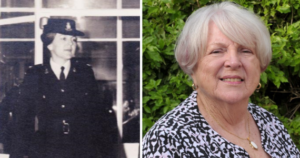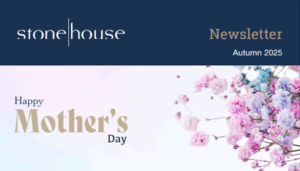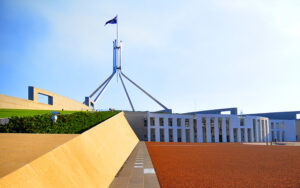 Our Practice Manager Jenna Wilson recently sat down with long-term client Judith Munday to ask about her history serving in the Australian Army and how this led her to a long life of community service which, now into her late 70s, is still serving and making a difference to the lives of so many.
Our Practice Manager Jenna Wilson recently sat down with long-term client Judith Munday to ask about her history serving in the Australian Army and how this led her to a long life of community service which, now into her late 70s, is still serving and making a difference to the lives of so many.
How did you come to join the Army initially?
I attended the Taringa State School which was next door to The Royal Australian Armoured Corps (RAAC) Barracks in Chelmer where the women serving were housed and they would drive by the school and toot their horns and wave to the girls as they passed. From then on this is all I wanted to do – go into the Army and drive a truck.
My parents had different ideas, so as a compromise when I was a bit older, I joined the Citizens Military Force (Reserves) in 1960 where I completed basic training and earned many transport licences. After a good 5-year record with them, it was a simple transfer and short course to transition over to the regular Army initially in Enoggera then Duntroon, WRAAC School and HQ 1MD in Brisbane.
The role of the Women’s Royal Australian Army Corps was to release men in time of war so women were posted into units as drivers, cooks, caterers, clerks, parachute packers, signallers and trainers to name a few of the trades. This allowed men to be sent to operational areas. Women, at that time were not allowed to be armed. Nurses in the Royal Australian Army Nursing Corps (RAANC) were the only women permitted, by Parliament, to go to any war or conflict. Initially, I was posted to the Transport Unit where I was trained as a driver and obtained various vehicle licences. From there I transferred to the Regular Army as a Commissioned Officer, the rank of Lieutenant.
What primary roles did you perform during your service with the Army?
In 1965, during the Vietnam War, I was promoted to Captain and served at HQ 6 Task Force, Enoggera Barracks. Once again, my role was Staff Captain Administration and I continued in that position until 1969 when I was posted to the Royal Military College (RMC) for 1 year doing similar administration and general organising of anything required including graduation parades and royal visits. Everything had to be perfect for those events!
I thought life had ended when I was posted to Sydney for 1 year as I really did not want to go. About 1 month into it I loved it! training of all new recruits, NCOs and officers moving through the base which was about 100 trainees coming through every six weeks. I had just been approved for a further two year posting in Sydney which I was happy about when I received a summons to my commanding officer and was told I had been singled out for the first-ever female exchange between the Australian and British Armies. This was a big thing at the time as Parliament had approved for the first time a female officer to be allowed to take part in the two-year exchange program that swapped one from each country to gain experience etc. They had been doing this with men for quite some time.
So, three weeks later I found myself on a plane to England where I served over two years in London as the Staff Captain (2IC) of a WRAC Coy and then posted, on promotion, to Bicester, near Oxford, as a Company Commander of an Ordnance Battalion. Whilst in London I was 2 IC of 12 Coy WRAC, which provided the staff for the British Forces Postal Office responsible for Defence mail sorting (GPO) hubs in London for all international mail, which at the time was extremely busy. I was also lucky enough to be sent off for excursions to Scotland where I attended the Edinburgh Military Tattoo, Germany to visit the WRAC company in Dusseldorf and many other interesting places. I never stopped laughing from the minute I arrived, felt so welcomed so it was an amazing experience.
After that ended, I came back to finish my commission in Sydney for another year before being posted back to Brisbane for 1 more year where I was the Senior Female in Queensland for the Army before being discharged in 1976 due to her getting married. At the time, females were not allowed to be in the Army if they were married which I found it very unfair but that is just how it was. They did change it about the time of my discharge.
[/column]
[column width=”1/1″ last=”true” title=”” title_type=”single” animation=”none” implicit=”true”]

What did you find most challenging about serving in the Army and how did you overcome these challenges?
It was a very trying time back then as we as females were not only limited to what we could do, but we also only got 72% of the male’s wages. We had to be better than them. It wasn’t just a case of doing the work, we had to exceed what they did just to keep our heads above water.
One of my biggest challenges was when I was serving in Bicester and I received a call from York House and they wanted to arrange a visit for the Colonel in Chief of WRAC, which at the time was the Duchess of Kent. They said the Colonel in Chief wants to visit you, I thought it was a joke, but she wants to visit Bicester Barracks where I was based. Whilst the accommodation was okay, but we had some terrible facilities- baths, showers, laundries etc, which were all built for men and not up to scratch to have someone such as the Duchess of Kent to visit.
At the time, she was on the hit list of the IRA which could have been a political nightmare and I only had a month to get the place up to par for her visit. I managed to push my commanding officers to fund improvements to the facilities including new baths, showers, and laundries in the one building. Then I decided to change the visit to another building and got funding approval to update that building as well.
When the Duchess did arrive for the visit, it was an amazing experience being her escort for the day and she was so charming and very pleased with what she saw so the visit went off perfectly. So not only did we make a good impression on the Duchess, but we also managed to improve the living conditions for all personnel posted to the barracks which was a massive boost.
Photo: Major Judith Munday escorting HRH The Duchess of Kent, Colonel in Chief WRAC
That leads into my next question – What was your most rewarding achievement/s while serving?
Having the Duchess visit was definitely a highlight, and I was also presented to her at a later date at York House. I was honoured to have a meeting with her and got invited to a garden party at Buckingham Palace which was very special.
Travelling the world was also a boon that I would never have experienced if I didn’t join the army, back in that day nobody travelled overseas or maybe only to New Zealand. It’s nothing compared to what it is now like today with my grandchildren travelling all around Europe already at such a young age!
[/column]
[column width=”1/1″ last=”true” title=”” title_type=”single” animation=”none” implicit=”true”]
You are a recipient of an Order of Australia Medal (OAM), how did you feel when you received this honour, and do you have any other commendations?
I was nominated for the OAM in 2008 by one of my colleagues on the Victory in Europe Committee which I was secretary for at the time. It was quite the surprise as they nominate you and include three referees to vouch for you and then the government assess your worthiness. I couldn’t believe it when I was advised that I was to receive this award and was honoured at Parliament house where I was presented the award by Governor Penelope Wensley followed by a reception with my guests. Such a wonderful experience.
Other commendations I received whilst serving was the Australian Defence medal, the National Service medal and the Long Service and Good Conduct medal that I received after 16 years of service.
Photo: Judith post-presentation of her Medal of the Order of Australia (OAM)
[/column]
[column width=”1/1″ last=”true” title=”” title_type=”single” animation=”none” implicit=”true”]
As you mentioned, you were discharged when you got married, was there anything or anyone that helped you transition to civilian life?
Yes, it was a terrible time, but I had no choice. I had just moved into a new home and I was just ironing 7 shirts for my husband, maintaining the house and new gardens. I remember getting invited, on my first day, to a Tupperware party of all things and thought is this what my life has come to?
Luckily, my husband encouraged me to go and meet my new neighbours and most of the wives turned out to be wives of soldiers that I knew and from that point I could relate to them on some level.
The first year was very hard but then the second year was easier with the arrival of my first son, Adam and soon after our second son, Bradley. Life got busy after that, but I still managed to set up the Women’s Royal Australian Army Corps (WRAAC) Association in QLD and became the first inaugural President. The WRAAC Association Qld is still going to this day and this type of work was what eventually led to my involvement with the RSL which really became a lifeline after my husband passed away.
Her husband had also been in the Army and was able to join the RSL a lot earlier than me due to his actual service overseas. Back in those days you couldn’t join the RSL unless you were returned from an operational area. He was the Secretary of the Australian Army Training Team Vietnam Association which was a highly decorated team that served in Vietnam. As it turned out he wasn’t much of a typist and I ended up helping him with the admin and this led to me joining the Kedron-Wavell RSL as by this time I could join.
I also served on the Council of Ex Servicewomen for 14 years and was heavily involved in my Church community. All these things kept me busy and I got really into computers which eventually led me to be the Manager of the Adult Community Education Unit where my husband worked at North Point College of TAFE.
I’ve held various roles with the RSL over the years but have now been the Company Secretary & Treasurer for the RSL South Eastern District Board for 13 years and will continue doing it for as long as I’m able.
How does the special work you and your team at the RSL’s do for or help returning veterans?
The RSL is there for the welfare of the veterans and their families. It provides a lifeline and support for those returning from service or simply transitioning from the defence force into normal civilian life but also on an ongoing basis through their lives.
Sometimes it could be just giving your time and sitting with someone for two hours as they have not been able to hold a job and need support. Other times it’s help accessing accommodation and food. Last Christmas I found out a soldier didn’t have enough funds to put food on the table on Christmas day and we simply transferred them funds to have a nice day and dinner with his family. I recently assisted with accommodation so one member could be near his family as they were going through a tough time. We just do whatever it takes to ensure the welfare of these people who need it.
Sometimes it’s mental health support or assistance paying for funerals if families cannot afford to pay. We want to develop drop-in centres where they can pop in for a coffee chat and gain access to a psychiatrist and a range of services that will get them on their feet. It’s helping them know what supports are out there and giving them assistance to access the help.
What has been your relationship and experience with Stonehouse?
It’s just been wonderful. About 9 years ago I pushed the RSL committee to get professional advice for the funds we manage as I report monthly on our investments. Term deposits weren’t doing so well at the time. I received some push back, but we had Andrew come along to present the benefits of advice at our AGM and answered all our questions easily. Meeting Andrew was like meeting a relative, he was so lovely and his charismatic personality soon won over the Board and gave them peace of mind that they were in good hands.
As time has gone by, I myself have become a client and have referred my sister when she needed assistance after selling her house. Unfortunately, both my sisters have recently passed away fairly close together and Andrew and a solicitor he referred me to have been wonderful assisting me through the long haul of sorting out estates which can be very messy. Now he has brought on Michelle to assist him and Belinda who has been there a long time, I know I can call anyone there and they will help me with whatever I need.
I have first-hand experience of the value of Stonehouse and their advice and by singing their praises three other RSL branches have now become clients, and all are very satisfied customers.
What will you be doing this ANZAC day?
There’s lots of organising that goes on in the lead up to ANZAC day, but on the day, I like to keep it low key. Normally I’d be going to the RSL at Geebung as I’m Patron of the Women’s Auxiliary and I can help there but this year as I’ve had a knee replacement, I’m going into the March at the Brisbane city. I’ll be sitting near the Dais in a tent and waving to everyone that walks by and old colleagues give me a yell and we catch up where I can. I will also look after a couple of WWII ladies during the day. I’ll spend the afternoon with my son and grandchildren which will be a nice way to end the day.
For all the younger generation, what would be your advice to them?
Get out there and do your best. This country is best in the world to live in and if we can step out to work towards saving this country and making it a better place to live and you can do that through the services. Get outside your comfort zone and give everything a try. Take advantage of the opportunities given to you and the benefits you can get out of it is amazing. You will get more out of serving this country than you put in.
In closing, Judith’s accomplishments throughout her life are ground-breaking and far-reaching. Her resilience shows her ability to overcome the many challenges in her life. Not only in what she’d listed in this interview but also includes a heart operation, two knee replacements and has beaten cancer twice which is simply astounding. Nothing can keep this selflessness, giving women down. That she expects nothing in return is humbling and we appreciate all she has done for our people and country and thank her from the bottom of our hearts. Judith, you are one incredible woman!
Jenna Wilson – Practice Manager





